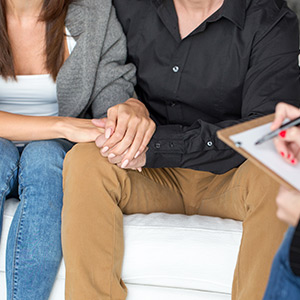Learning How to be in a Relationship
There are four primary ways that we learn how to be in a relationship.
Our first introduction to relationships is usually through our parents. They show us how to behave with one another. They teach us about rules and expectations and demonstrate through their own actions how to manage conflict and communicate with one another. In essence, they serve as role models. The problem with this method of learning is that our parents may or may not have been the perfect role models. Research shows that couples who are doing well and are happy typically come from intact happy parents and mimic the ways of being that sustained their parent’s relationship in their own relationships. Alternatively, people in strained relationships often come from broken or distressed family backgrounds. What they learned from their parents may include a variety of negative ways of behaving in a relationship, such as control, codependency, criticism, neglect, unrealistic expectations, etc. As children, we watch our parents closely and mimic their behavior. We subsequently have a tendency to repeat their mistakes. In short, if your parents’ relationship was unhappy, unless you’ve learned another way of being, yours is likely to be unhappy as well.
A second way that we learn about relationships today is through social media. The different types of media available, including Facebook and Instagram, tell us what our peers are doing. The problem is that the media is falsely skewed. People post pictures of themselves with their partners when they are vacationing, happy and able to snap that perfect selfie! Only trouble is . . . Most people are not snapping and sharing pictures of themselves and their spouses that reflect their early-morning poor hygiene, moments of irritability and the craziness that happens when people get to arguing! The fantasy life that is portrayed on the Internet is not true or realistic, but often is effective in making the viewers feel like they have less than another. “Did you see Mary’s Facebook post? She is with that new guy, John! They were at that place in Philly dancing and having fun!” The post doesn’t show that John dated a different woman the night before, that they each paid their own way or that John became drunk and Mary had to uber home! There is so much that happens between posts that the reader doesn’t know. The media, therefore, sets people up to have high and unrealistic expectations of relationships such that when they compare their own, they feel inadequate and distressed.
The third way that people learn about relationships is by being in them and winging it! This is the learn as you go style. Unfortunately, it results in what I would term to be impulsive responding. Rather than understanding what a beneficial response would be, people react to circumstance impulsively and often destructively. This, of course, results in a negative response from the other and, before you know it, the relationship spirals down. They don’t know how to change their relationship pattern and begin to blame their partner for the rocky times, ultimately pondering whether they’ve chosen the right person. Sometimes, they leave that person, only to find that the same issues arise in their next relationship. They haven’t learned anything, so they simply repeat what they’ve done before, of course, getting the same bad results. This is the reason that second and third marriages are statistically no more successful than the first.
The last major way that people learn about relationships is through formal education. By this I mean acquiring therapy, listening to podcasts, participating in workshops, attending seminars and reading books and articles. Formal education is the most viable way to make realistic and beneficial changes because it typically is presented by experts who have come to learn what does and doesn’t work, allowing you to apply the knowledge in your own relationship. Formal education, however, requires a greater commitment from you then do the other ways of learning. Specifically, formal education will require from YOU a great deal of openness and effort. You have to be open so that you can see things from a different point of view and make the changes that you should make. Initially, you will have to practice what you learn and this will take conscious effort to interact with your partner differently, but eventually, it will come naturally! Formal education is the best way to learn as the other three ways leave you to repeat the same mistakes. Educating yourself on what really works gives you the tools you need to create a happy relationship. This method takes a little more effort, but it will be worth it in the end!


